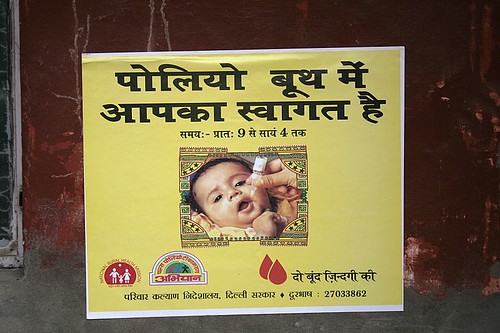 India has successfully completed three years without any newly diagnosed cases of poliomyelitis anywhere in the country. As a result, the World Health Organization (WHO) is expected to certify India as a polio-free country in March. Due to India’s size and its dense population of 1.2 billion people, polio eradication had seemed like a nearly impossible goal. This impressive success will inspire the country as it works to address other diseases that continue to affect its people.
India has successfully completed three years without any newly diagnosed cases of poliomyelitis anywhere in the country. As a result, the World Health Organization (WHO) is expected to certify India as a polio-free country in March. Due to India’s size and its dense population of 1.2 billion people, polio eradication had seemed like a nearly impossible goal. This impressive success will inspire the country as it works to address other diseases that continue to affect its people.
In 1995, more than 50,000 children contracted polio in India yearly. While as recently as 2009, India reported more than half of the world’s cases of polio infection, less than two years later, on January 13, 2011 the country recorded its last case of the virus.
“After this historic victory of humankind where millions of lives have been saved through tireless efforts of many, we have to take care of neighbours also. We should commit ourselves to creating a polio-free world,” declared President Pranab Mukherjee.
The poliomyelitis virus spreads readily especially in unsanitary conditions. It mostly affects young children, with the majority of them experiencing symptoms of fever, muscle stiffness and pain, vomiting and lethargy. Additionally, one in 200 infected children will suffer from an irreversible paralysis that leads to death in 5 to 10% of cases.
India achieved eradication through several health initiatives that targeted poor and marginalized populations throughout the country. This included an aggressive vaccination campaign that sent more than 2 million healthcare workers throughout the country to deliver vaccines to almost every child under the age of five years old. Additionally, the country developed a highly effective integrated disease surveillance system which monitors for and responds to the outbreak of disease. The Indian government is hoping to use the procedures, policies and programs they developed to deal with polio as a model to help the country combat other devastating disease such as measles, diphtheria and pertussis which are targeted by India’s Universal Immunization Program.
According to Prime Minister Manmohan Singh, “our success in eradicating polio has made us more confident of achieving our objectives of full immunisation against preventable diseases, universal healthcare and strengthening of primary healthcare infrastructure to address the needs of the most under-developed societies.”
In 1998, Ministers of Health from every WHO member nation met at the World Health Assembly and set the goal to eradicate poliomyelitis globally. Polio was endemic to 125 countries at that time. Now with India’s success, polio only remains endemic in the three countries of Nigeria, Afghanistan and Pakistan.
“India has shown the world that there is no such thing as impossible. This is likely the greatest lesson, and the greatest inspiration for the rest of the world,” stated Margaret Chan, head of the WHO.
Creative Commons Love: Ramesh Lalwani on Flickr.com
Written by Amanda Lubit
